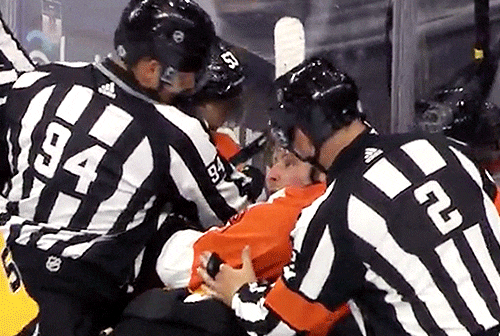
warning: flashing gif at the end
Hello! As I was gearing up to sit down and write this week’s newsletter I did as I normally do and reread one or two older newsletters to get in the right frame of mind. This week I read the entry from March 17, 2020, from right at the start of All This Foolishness. I would say that it’s hard to believe it’s a year and a half later and we’re still fighting about mask mandates and vaccines, but here we are.
August has traditionally been a very slow month in publishing, and this year is no different. If any thing, it’s even slower. It doesn’t matter whether people are remote, in-person, or on the moon: no one wants to be reading their email this month. It’s hot as hell and half the country is on fire. It doesn’t matter that most of the people I know in publishing don’t have summer homes to decamp to; everyone is making like it’s Hamptons hours and taking the month off emotionally, if not actually physically.
What does this mean for authors? It means that not a lot is happening. If you have a book coming out this month, I’m sorry — if you have a book out on submission or are querying, I’m really sorry, because you probably won’t receive a response until September.
But the doldrums don’t mean that August is a waste. Just because you’re not moving forward doesn’t mean you’re moving backward. Sometimes standing in place is fine, too. So if you’re able to, I hope you can take time this month to read some good books (or some bad ones) and be kind to yourself—and to the publishing professionals who are strugs 2 func in all this heat.
HOUSEKEEPING
Do you have a question about writing, publishing, books? Is there something you want covered in this newsletter? Do you have a burning desire to hear my thoughts on the Chicago hockey team’s terrible record of aiding and abetting sexual predators? Leave it in the comments or in a reply to the newsletter!
THIS WEEK IN HOCKEY

Man, I don’t know. It’s still summer. The Olympics are over, the football pre-season is happening, we’re all marching towards the Delta wave with the determination of a group of lemmings approaching a cliff. Here, have an article about Kirill Kaprazov’s contract talks with the Minnesota Wild.
LINKS
Grief & Conspiracy 20 Years After 9/11 by Jennifer Senior (The Atlantic)
Early on, the McIlvaines spoke to a therapist who warned them that each member of their family would grieve differently. Imagine that you’re all at the top of a mountain, she told them, but you all have broken bones, so you can’t help each other. You each have to find your own way down. It was a helpful metaphor, one that may have saved the McIlvaines’ marriage. But when I mentioned it to Roxane Cohen Silver, a psychology professor at UC Irvine who’s spent a lifetime studying the effects of sudden, traumatic loss, she immediately spotted a problem with it: “That suggests everyone will make it down,” she told me. “Some people never get down the mountain at all.”
Everything I’ve Learned About Being a “Professional” Writer in One Post by Lincoln Michael (Counter Craft)
There Aren’t Any (Useful) Secrets There aren’t any hidden secrets to succeeding as a published writer. You can find all the generally correct advice about the basics—on query letters, lit mag submissions, contracts, whatever—with a few hours of Google searching. That doesn’t mean there aren’t writers whose success seems like a secret. Family connections, inherited wealth, professional nepotism, etc.—not to mention bad taste—are all at play in publishing as they are in any aspect of life in late-stage American capitalism. But there is no secret way to get those things if you don’t have them already. (Or at least I don’t have useful advice on going undercover as a person of affluence on a luxury cruise liner to seduce then swindle an aging billionaire publisher or whatever.) The real “secrets” you can use are the obvious ones: work hard, don’t give up, learn your shit, do good work.
An investigation of how Legolas got on that horse that one time by Max Covill (Polygon)
In the warg attack sequence of The Two Towers, Legolas has gone ahead to observe the oncoming foe, and as the Rohirrim catch up to him he senses Gimli approaching on horseback. Legolas turns, grabs his galloping steed by the breast collar, and then he swings in front of the horse, rotates in the air, and lands in the saddle in front of Gimli. It’s a spectacular stunt, showcasing the elf’s agility and strength. And it’s a magnificent feat of visual effects work from Weta Digital. But why on Middle-earth was it necessary to have him get on a horse that way? And is there any chance that it’s a physically possible thing to do, by man or elf? Surely, a scientist and the folks at Weta Digital had answers.
LINKS, REDUX


Ask A Fuck Up: I Got Old | The Case Against Sticking the Landing | The best of Twitter’s ‘My Fall Plans vs. the Delta Variant’ meme | massachusetts holy ghost | Evander Kane’s relationship with teammates and the Sharks organization may be irreparable | “We will return”: the battle to save an ancient Palestinian village from demolition | Beyoncé’s Evolution | Ted Lasso Can’t Save Us
This has been A Faster No, a dispatch on publishing, writing, books, and beyond. Is there something you’d like me to talk about? Leave it in the comments or reply to the email! You can support the newsletter here. If you purchase a book from any of the links to Bookshop.org I get a small commission at no cost to you. I am available for developmental editing and editorial assessment services via Reedsy.







